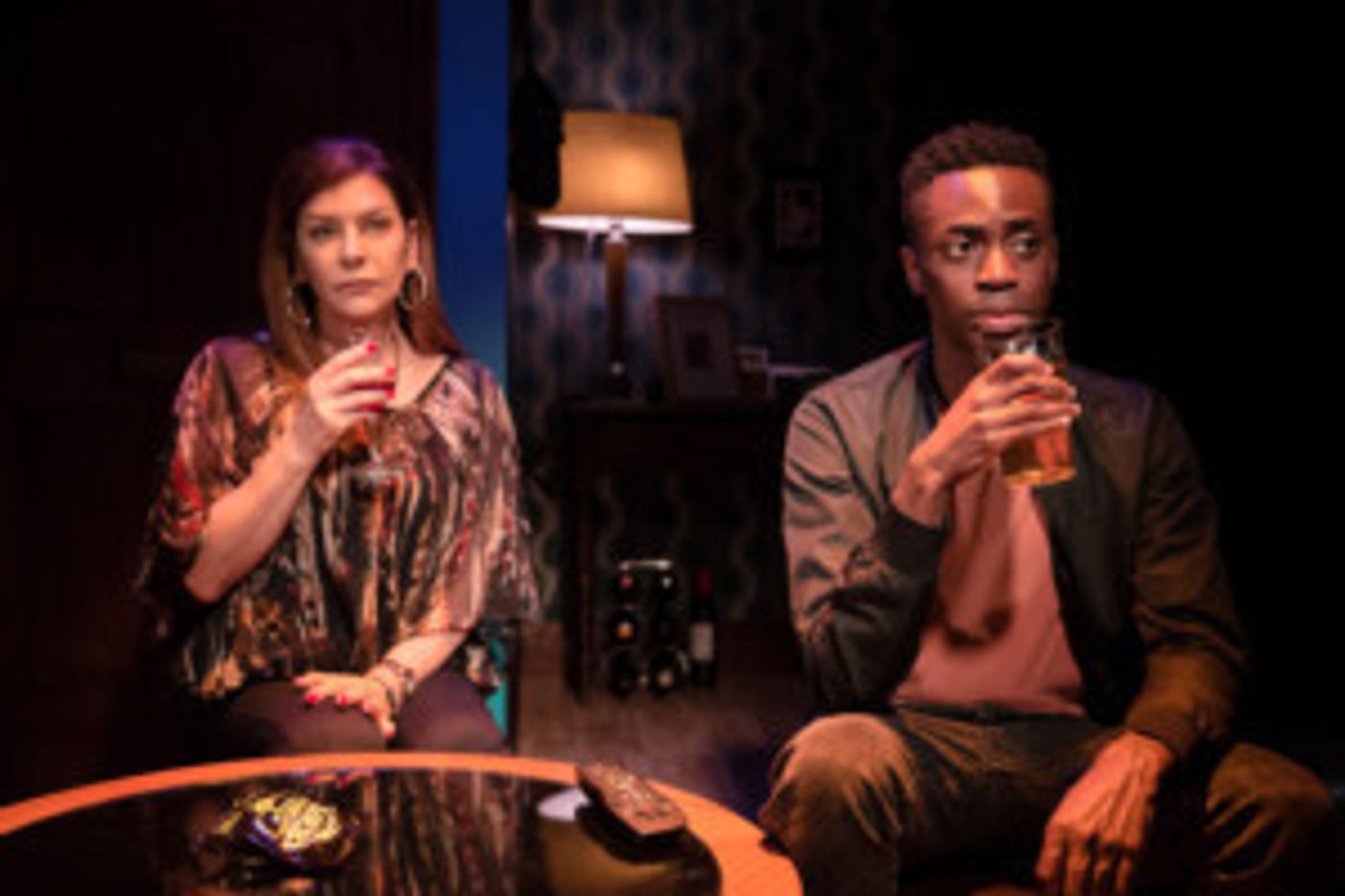Review: DARK SUBLIME, Trafalgar Studios

Sadler's Wells" height="35" src="https://cloudimages2.broadwayworld.com/x2stars.png?format=auto&width=1400.pagespeed.ic.gnM_G4S2Hc.png?format=auto&width=1400" align="right" width="151" />
At about half an hour into Michael Dennis's debut play Dark Sublime, the uncomfortable thought occurred to me that there was still two hours left to go. The piece had opened strongly with numerous jokes directed at the arts industry, but already it felt as if it had played its hand. Sadly, my fears were correct, and what followed was an uninteresting exploration of a woman haunted by the past.
Yes, I use the term 'woman' specifically, not 'actor' or 'celebrity'. Dark Sublime should provide a look into the life of Marianne (Star Trek's Marina Sirtis), who starred in a TV show of the same name 35 years ago that has since become a cult favourite. Oli (Kwaku Mills) nervously bursts into Marianne's life to interview her about the experience, introducing her to the obsessive world of fandom. Oli organises the Rubicon Convention, a celebration of Dark Sublime, and invites Marianne to be part of a panel alongside her old castmates.
Regrettably, however, Dark Sublime is bogged down by numerous unhelpful subplots. Marianne's long-term friend Kate (Jacqueline King) has met the young Suzanne (Sophie Ward), which strains the older women's relationship. Also, Oli has met a young man, Joel (not actually in the play), and seeks advice from Marianne. In both instances, Marianne fails to support her friends, pushing aside those who care for her.
Alongside all of this, Simon Thorp intermittently enters dressed as Vykar, a character from the original Dark Sublime show. Marianne tells Oli of an unaired finale to Dark Sublime (the Holy Grail of any fan), which is slowly presented to audiences through inset scenes that go on for far too long.
Tim McQuillen-Wright's set design works well for the opening scenes, which are set in Marianne's flat. However, as the play progresses and the environments move between a spaceship, a park and a hotel room, the personal pictures on the wall, mediocre television and drinks cabinet prove unhelpful.
Frustratingly, there are moments within Dark Sublime that hint towards what could be an alternative look at celebrity culture. Numerous questions automatically come to mind when thinking about this topic. How do fans cope when they meet their idols? How do their idols cope when the encyclopaedic knowledge of their careers, lives and beliefs is summoned instantly by the fan?
Moreover, there are three generations of fans present in Dark Sublime. Kate met Marianne when the original series was being filmed, whilst Oli is coming to it 35 years later. Suzanne is also a fan of Marianne's later work in Emmerdale. What does it mean when these people are gathered together in adulation of one individual? This is never addressed, and, instead, in focusing on Suzanne and Kate's relationship, Dark Sublime becomes misdirected in its approach, mired by its own inability to hone in on a unique topic.
One of the funniest jokes in the play is when Oli recalls a 1989 interview between Marianne and Terry Wogan, where the former explained her frustration at never getting a drink late at night in a hotel. Hence Oli has a bottle of brandy in his bag for a post-convention drink. The nature, utility and efficacy of this bizarrely detailed knowledge, which some might deem worryingly so, would be much more interesting to dissect. What does it mean to be a fan?
Kate interestingly raises the question of why people aren't asking for her autograph after she has managed over £16k worth of cuts to her department at work. Examining the nature of celebrity culture and what it means for those surrounding those deemed 'famous' would have given Dark Sublime a much-needed focus.
There are references littered throughout the play to the other actors of the original Dark Sublime and what they are doing now as careers. Rather (un)surprisingly, barely any of them are acting any more. Yet Marianne smiles as she explains how a cheque for £40 came through the post for a recently aired rerun of a show she did. Another provocative topic then might be how Marianne feels at being remembered for only one role. She indignantly declares how she once played Portia and Hedda, and her anger and frustration is a tempting provocation for audiences to think of how celebrities consider their own legacy.
What is needed, perhaps, is a reorientation of not Marianne, but those who surround her. Set the piece more at the convention, or tie the adaptation of the final episode much more closely to Marianne and what it meant for her when this defining series was cut. Add in other fans - especially this faceless Joel - with their own personal complexities and levels of dedication to the show, and explore the simultaneous processes of dehumanisation and personal exaggeration that come with celebrity.
Dennis's humour is mostly successful, but there is an uncomfortable predilection to the jokes. Characters do not hear another properly, leading to an ironic miscommunication, or a sharp quip closes a section of conversation. There were only so many references to 80s television culture this mid-90s baby could pick up, but even they become dry long before the play's end.
The jokes that got the largest laughs, however, focussed on show business. One particular anecdote about Princess Margaret and foam penises landed particularly well, as did the description of an 'alternative' production of Sondheim's Gypsy that involved an oversized puppet giving birth to a potato. It is the insider, behind-the-scenes knowledge of these celebrities that interest us today, and Dark Sublime needs to lean into its target audience more.
All the performances are sound under Andrew Keates's direction, and the suggestions above indicate that Dennis is clearly onto something with this show, but at present Dark Sublime falls short of its purpose. Beam me up, Scottie, and take me away.
Dark Sublime is at the Trafalgar Studios until 3 August.
Photograph Scott Rylander.
Reader Reviews
Videos

